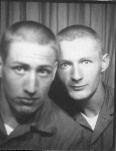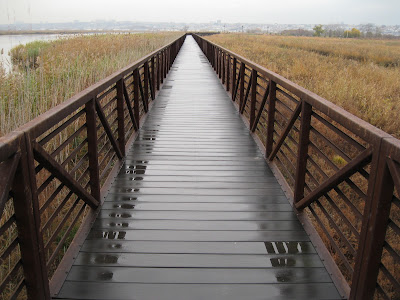Chapter30: Like New York yet not
When the last bags banged down the front steps of the bus
and the driver had opened the belly of the beast to recover those buried there,
I rose, pulled down the brief case I had purchased in Philadelphia from the
rack above my seat and slowly made my way to the front of the bus, my shoes
squeaking on the rubber mat of the aisle, seemingly overly loud in the totally
vacant interior.
The professor, the lovers, the man with a hacking cough, the
Wartons, all gone, already a memory.
"This is it," the hostess said, greeting me near
the door, perhaps a bit startled to find I had lingered.
I dropped down the three steps to the platform where I found
my suitcase from the belly of the bus already waiting, the last piece of the
puzzle that allowed the driver to close up the compartment.
Through the fumed-stained glass of the depot, I saw the
other passengers scattering, making their way to the street to catch cabs or
meet friends, lost souls in the City of Angels, I thought.
The fumes of buses idling along the platform pressed against
my chest. Again, it was as if I hadn’t left New York, although the November
temperature of 70 degrees told me differently.
Light spilled from the street onto the oil slick concrete
floor of the few vacant slots for buses, a shimmering stew of black mixed with
red and blue, again reminiscent of similar platforms I’d stood at in New York,
but more compact, as if this was a miniature version.
Some of the drivers from some of the other buses eyed me
suspiciously because I had not moved on, still lingering on the wrong side of
the terminal doors when I should have rushed out to make a connection to go
elsewhere.
Finally, gripping the handle of my briefcase in one hand and
my suitcase in the other, I pushed through the glass door to the terminal itself,
struck immediately by the stench of human occupation, perfume and cologne, body
odor, stale booze, even urine with a more intense scent of cleanser and bleach,
emanating from the mop and bucket of a maintenance worker spreading liquid over
the titled floor with a broad and dirty mob.
The wet floor reflected the pale florescent light that
illuminated the terminal, rows of lights hanging over rows of wooden benches,
many of which were filled not with passengers bearing luggage but with ragged
people clutching bundles of what looked to be rags, from which a whole
different stench rose.
There were passengers, of course, some seated in the rows of
benches, other standing near the doors to the platform, all keeping their
distance, dressed too lightly for the apparent destination east or north where
real winter with legitimately frigid November temperatures loomed, as
unprepared for the wilderness as their wagon train ancestors had been, not
likely to encounter savages or die on the side of the road, but clearly too
used to the mild weather of a Los Angeles winter to long endure elsewhere
dressed as they were.
I, on the other hand, was somewhat overdressed, still
wearing the same brown suit I had put on at my uncle’s house three days
earlier, now thick with three days of traveling having captured not only the
stink of my mostly unwashed body, but carrying also the smells I had acquired
by long occupation in the enclosed space of the bus, the perfume and colognes
of other passengers, my cigarette smoke as well as the reek of the professor’s
pipe and the tang of the old man’s cigars.
I desperately needed to wash, if only to live with myself,
which meant I needed to find a place to stay the night, a motel or hotel
nearby. I also needed a change of clothing. But that would have to wait until
morning at which point, I could hunt up a store somewhere in the wilds of
downtown LA.
Although I had compared this terminal to the one in New
York, this did not compare in size or complexity, a single large room whose
center was filled with benches with one wall lined with ticket booths, with
doors to the loading platforms to one side, doors to a currently closed lunch
counter to the other, and doors to the street along the remaining wall.
While the room had plenty of windows, years of exhaust had
turned their once-transparent panes into something barely translucent, light
passing through them from outside, but little else. This being night, the dim
lights of down flashed like a psychedelic lightshow, from strip club marques,
passing headlights, and the constant steady changes of the traffic lights from
green to yellow to red.
Newspaper machines boasted headlines of Joe Kennedy’s death,
the seventh victim of the Zodiac killer and the deaths of a movie star named
Sharon Tate and her friends, giving me a strange foreboding about what kind of
world I was stepping into. A few bored police officers prowled the benches,
tapping the shoulders of those ragged hobos who nodded to sleep, telling them
if they can’t stay awake, they have to leave, then as the cops moved on, the
heads nodded again, as if this was all some kind of show.
I headed for the doors to the street, and once outside,
paused again, startled by the police cars parked at the curb, and officers in
the front seat of each sipping coffee from paper cups, none looking in my
direction, but alarming none the less.
I caught sight of a few of the passengers from the bus,
climbing into cabs. The Wartons put their bags in the back of a wooded-sided
station wagon, none aware of me as I turned in the other direction.
A warm wind blew through the wide street, moist against my
neck, as if someone’s breath, filled with the scents of an unfamiliar city, not
like New York with its Times Square hotdog stands, or the roasted chestnuts
from street carts, although exhaust fumes filled in the gap of the unfamiliar
with an all-too familiar stench of idling automobiles.
Overhead, lining both sides of the streets were the usual
array of street lights, many bulbs extinguished, while side by side with them,
giraffe-necked trunks of palm trees, their dark growth clinging to the tops.
A city bus’s breaks hissed as it stopped to pick up a few
lonely passengers from the corner, a city bus that looked exactly like those up
7th Avenue in New York City, only yellow instead of green, tinted windows
hiding the array of passengers inside and reflecting the gauntlet of neon and
other store signs that advertised the wall to wall stores along this block and
every block for as far as I could see.
I heard the clink of metal behind me and looked back to see
one of the patrol cops making his way up the wide sidewalk, his gaze firmly
fixed on me.
A tall, broad-shouldered man with a brown hair, dark eyes
and a wide mouth set in a grim expression that made me feel a little jumpy. My
grip tightened around the handle of my briefcase.
“Are you lost, son?” the cop asked, his features become
clearer as he came under the glow of the street light, showing he was older
than I thought at first, and less grim, the reflection of the changing traffic
light flashing off his oval badge.
“A little,” I said. “And a bit nervous. I just got off the
bus and I’m looking for a place to stay for the night, only…” I glanced around.
“This place isn’t quite what I expected.”
The cop gave a deep laugh.
“Buses leave people off in the worst neighborhoods,” he
said. “Unless you take the bus to Hollywood, and even that place is nothing to
boast about. Don’t worry, son, the city gets better the farther you get from
downtown, though this is L.A., and no place is totally safe.”
“I’m looking for a place to sleep,” I said. "I didn't
get much rest on the bus."
His dark eyes studied me for a long moment, then he gave a
nod.
“I imagine not,” he said. “Nobody does.”
"You wouldn't happen to know of a good hotel?"
“There’s a hotel down the street,” the cop said, jabbing a
finger further down towards the array of neon signs. “It’s clean. But it’s
costly.”
“I -- I have some money," I said.
"Good," he said. “Try not to get mugged before you get there. This is a tough neighborhood.”



Comments
Post a Comment